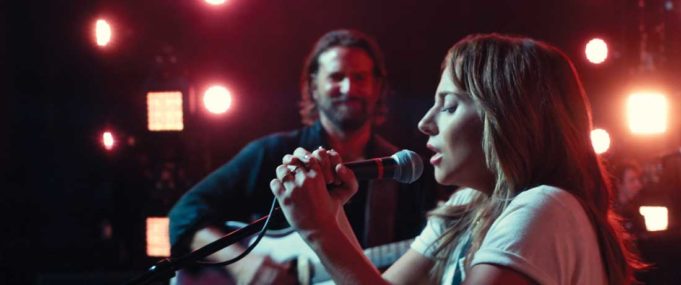It’s an evergreen story, the one about a star on her way up marrying a star on his way down. That’s why A Star Is Born was first made back in 1937 and has been remade three times, most famously in 1954 with Judy Garland and James Mason. For all the predictions I’ve heard about this latest version being either great or terrible, I have to say it lands in between, though thankfully much closer to the former than the latter.
First-time writer-director Bradley Cooper stars as Jackson Maine, an arena-filling country-rock star whose hard lifestyle makes it a race to see which will get him first, his drug and alcohol abuse or his gradual hearing loss. His need for a drink after a gig leads him into a drag bar in New York City, where he’s starstruck to see Ally (Lady Gaga) onstage singing “La Vie en Rose” and sounding just like Edith Piaf, only with more power in reserve. Music executives only see a short girl who’s not classically pretty, but Jackson sees potential star power in her, tells her that she’s beautiful, and hauls her up onstage at his shows to display her enormous voice.
If Cooper directs with rather more competence than flair, he is quite good with atmosphere, whether he’s in that cramped drag bar, on the set of Saturday Night Live where Ally performs, or at the dusty Arizona ranch where Jackson grew up. Like many actors-turned-directors, he gives his castmates space to do their thing, and his actors seize their chance: Sam Elliott as Jackson’s manager and older brother who finally has enough of his excesses, Ron Rifkin as a rehab counselor, Andrew Dice Clay as Ally’s dad who supports her but not always in the best way. Cooper’s own performance wisely goes in for understatement, but he gets it wrenchingly right in a scene by a bathtub as Jackson realizes that Ally will be bigger than he ever was and turns his rancor on her. He co-writes many of the songs as well, and they come out strong thanks to his collaborator, Lukas Nelson, the son of Willie who also lends his backing band, The Promise of the Real, to Jackson’s hard-edged sound. Not every movie star makes a credible rock star, but hearing Cooper sing the wistful ballad “Maybe It’s Time,” you can see it.
The main problem is, if you’ve seen any of the three previous versions of this film, you know how this plays out. The romance between Jackson and Ally is by-the-numbers, and the retired bluesman (Dave Chappelle) who has had his own addictions is a cliché. The nature of music stardom has changed radically in recent years, and the movie doesn’t seem to know it. The climactic scene in which Jackson epically embarrasses Ally during her big moment at the Grammy Awards — which has its counterpart in all three previous versions — is a blown chance to show how much worse his drunken antics would be with today’s social media. (Also, it’s a small thing, but a single-named pop star wouldn’t be called “Ally.” Couldn’t the writers have come up with a better name, especially since it’s the only name we ever know her by?)
The trump card here is Lady Gaga. Sure, you can say she’s not exactly stretching as a working-class New York City girl who becomes a pop star, and who knows from this one film whether she can play a lawyer or a spy or a suburban mom? Let’s remind ourselves that casting a first-time actor as a character much like herself is no guarantee of a good performance. Yet that’s what she delivers, providing not only Ally’s necessary star presence onstage and musical chops but also being funny in the right spots and stepping up after tragedy descends on her in view of the world. If she isn’t exactly as powerful as Garland in the 1954 movie, she is exactly this character, and it’s hard to imagine any professional Hollywood actress inhabiting the part as completely as she does. Without her, the crowd-pleasing show business tragedy of A Star Is Born wouldn’t work as well as it does.
A Star Is Born
Starring Bradley Cooper and Lady Gaga. Directed by Bradley Cooper. Written by Eric Roth, Bradley Cooper, and Will Fetters, based on Moss Hart’s screenplay and John Gregory Dunne, Joan Didion, and Frank Pierson’s screenplay. Rated R.












